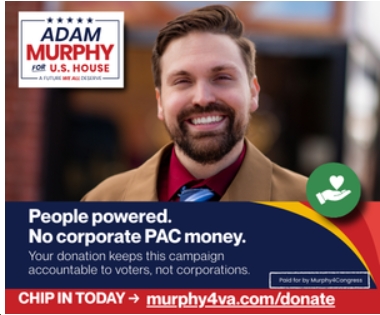by A Siegel
I appreciate, seriously, the efforts to develop, draw attention to, pass the sort of legislation that required in our times. Within my space, two bills have represented two overlapping visions and paths for moving Virginia toward a cleaner, climate-sensible future: the Virginia Green New Deal (GND-VA) and the Virginia Clean Economy Act (VCEA).
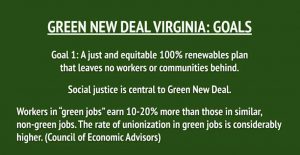 In Richmond, the GND-VA legislation has fallen by the wayside. Even though aligned, strongly, with the principles, ideals and concepts of the GND, I see that the challenges weren’t just ‘what will The Dominion Way‘ allow legislators to do: it required (and hopefully will have) further development as to legal structures, specific code language, technical details, and beyond.
In Richmond, the GND-VA legislation has fallen by the wayside. Even though aligned, strongly, with the principles, ideals and concepts of the GND, I see that the challenges weren’t just ‘what will The Dominion Way‘ allow legislators to do: it required (and hopefully will have) further development as to legal structures, specific code language, technical details, and beyond.
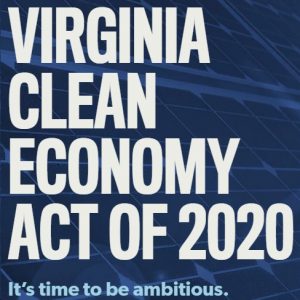 On the other hand, from it’s outset, the VCEA was pre-compromised (doing so much of the ‘sausage-making’ of legislation development before the public saw a syllable), with inadequate targets, and too cognizant of Dominion’s (and Appliachian’s and other business) interests before those of the actual citizens of Virginia and the realities and necessities of the climate crisis. I’ve regretted, with dismay, how backers (such as environmental organizations) have band-wagoned behind VCEA with cheer-leader like enthusiasm, rather than providing openly painful statements of pragmatic support even as the bill has (from what I can tell) been weakened further. I have been dismayed at too many exaggerated statements about what the VCEA really means in terms of Virignia’s status among the states in terms of clean-energy leadership. Thus, to be clear, I don’t ‘like’ the VCEA. I do not believe it is ‘what’ we need. I know it is not ‘enough’.
On the other hand, from it’s outset, the VCEA was pre-compromised (doing so much of the ‘sausage-making’ of legislation development before the public saw a syllable), with inadequate targets, and too cognizant of Dominion’s (and Appliachian’s and other business) interests before those of the actual citizens of Virginia and the realities and necessities of the climate crisis. I’ve regretted, with dismay, how backers (such as environmental organizations) have band-wagoned behind VCEA with cheer-leader like enthusiasm, rather than providing openly painful statements of pragmatic support even as the bill has (from what I can tell) been weakened further. I have been dismayed at too many exaggerated statements about what the VCEA really means in terms of Virignia’s status among the states in terms of clean-energy leadership. Thus, to be clear, I don’t ‘like’ the VCEA. I do not believe it is ‘what’ we need. I know it is not ‘enough’.
Yet, the time has come to face a clear reality: the GND-VA will not pass the House, it will not become law (this year). While those who developed and are promoting it have set a marker and opened a conversation, that conversation and development will need to be continued into the coming year. The questions before us (the legislators):
- Are we better off with the (seriously flawed and inadequate) VCEA or better with no headline energy/climate related legislation?
- Are we better with press reporting how energy/climate legislation was killed or with a messaging that Virginia has legally mandated a carbon-neutral economy, created an RPS, legislated for significant energy efficiency investments, and has had environmental organizations and the public achieve a (very partial, inadequate, uneven) win over Dominion (in what might be a sign of change to The Dominion Way?
When it comes to the VCEA, I know it
- is inadequate, in terms of confronting the climate crisis.
- falls short of creating anything close to a ‘best-in-class’ set of conditions for improving the lives of Virginians and the Virginia economy.
- is based on faulty analysis.
- relied too heavily on special interest (not just industry) studies and lobbyists.
- has too many concessions to and sweet heart deals for major corporations (notably, but not solely, Dominion).
- merits amendments and modifications.
- has elements that risk locking in problematic and expensive conditions that could be difficult to reverse in coming years.
- will not achieve so many valuable and necessary social goods.
I know all of this and, yet, holding my nose, I support its passage.
With all its (all too serious) flaws, the VCEA would
- Legislate Virginia on a path toward a carbon-neutral power (electricity) system (100% clean electrons by 2045);
- Mandate a Renewable Portfolio Standard (RPS);
- Boost (potentially significantly) energy efficiency; and
- Set into law a number of other meaningful and praiseworthy elements.
The VCEA would move Virginia from a true laggard on clean energy and climate policy to a position at least solidly in ‘the middle of the pack’ with the potential that it helps set the structure for even more serious moves forward in the coming years.
Please consider this seriously: It is time for us to hold our noses.
And, in holding our noses, to be figuring out paths forward to achieve what is necessary and valuable.
It is time for those who understand the urgency of the climate crisis to coalesce to, however grudgingly, come to the table to help VCEA’s passage even while working to modify the VCEA (and/or other legislation) for the better and that will help achieve better things tomorrow.
As to ‘modify’, here are two discrete ideas:
- A VCEA mandate for establishing a government team for analyzing multisolving and fully-burdened, system-of-system cost-benefit analysis (with a start focused on energy/climate)
- We seriously ‘don’t know what we don’t know’ and one of the items holding ‘us’ back from far more aggressive action is stove-piped analysis that looks at utility bills but doesn’t account for increased economic activity; that looks at fuel costs but doesn’t account for asthma rates; that ….
- Virginia needs to have serious system-of-system analysis and planning if we are to make a reality of a GND as the true payoffs come from benefit streams are so multi-faceted that our current ‘accounting’ processes are unable to deal with them.
- We need a team that will help the Commonwealth move from 19th century to 21st century ways of understanding and discussing investment/returns from public policy actions.
- The Electric School Bus legislation that is moving forward essentially gives Dominion control of the program with little-to-no public visibility on cost-benefit analysis, procurement decision-making, etc …
- It could represent something in the range of $5-$10B of public procurement implications yet leaves the core decisions to Dominion and
- It doesn’t secure many reasonable payoffs for Virginia (such as having a ‘made in Virginia’ content requirement’ which could mean 1,000s of good paying manufacturing & equivalent jobs).
- We should make ESBs more of a public(-private) rather than a private dominated/driven program
- An example: Dominion is requiring seat belts at perhaps $150M in total cost over ten years without any public discussion of their cost-benefit reasoning for that requirement. This is not supported by the serious analysis over the years and is NOT a decision that a private entity should make over public procurement.
- Should the VCEA be modified to mandate that the State Corporation Commission (SCC) consider job creation within any decision-making for major projects like offshore wind and the electric school buses? While Hampton Roads area will be biggest beneficiary from Offshore Wind, what about putting targeting securing 1,000s of ESB manufacturing jobs for SW Virginia?
I know it is hard to get there, but sometimes it is time to ‘hold the nose’ and support mediocre and inadequate because the option of nothing is worse.



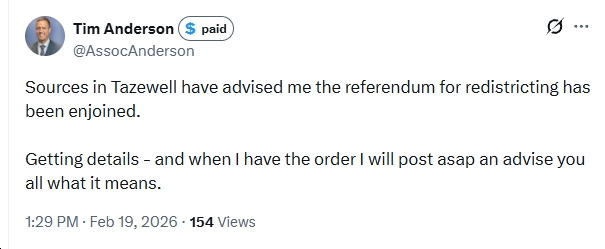

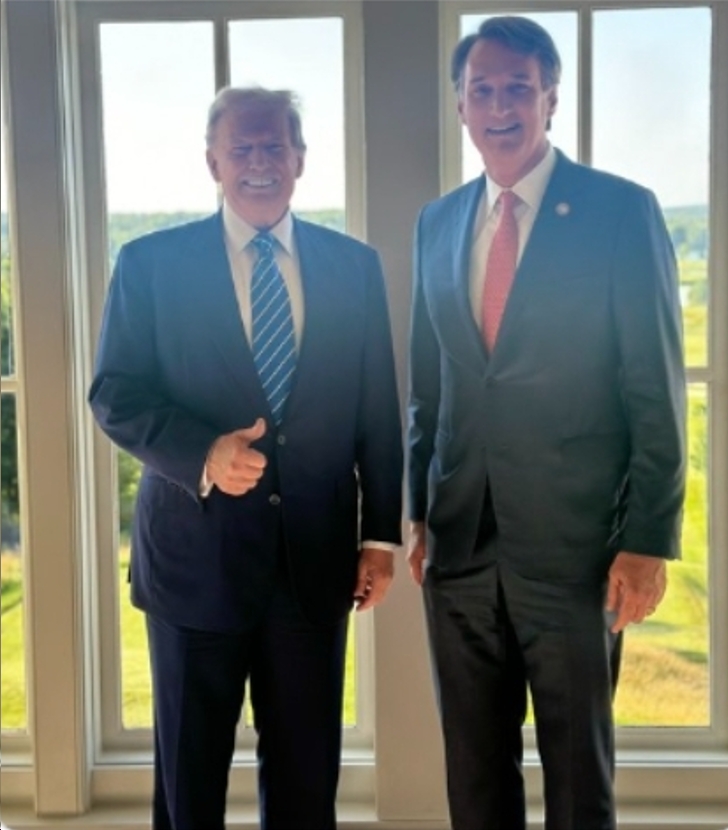
![Saturday News: “Trump’s latest tariff TACO probably won’t make your life more affordable”; “The Epstein Email Cache: 2,300 Messages, Many of Which Mention Trump”; “[MTG] questions if Trump is still the ‘America First’ president”; “Jim Ryan tells all: ‘What did the Governor know, when did he know it?’”](https://bluevirginia.us/wp-content/uploads/2025/11/montage1115.jpg)
